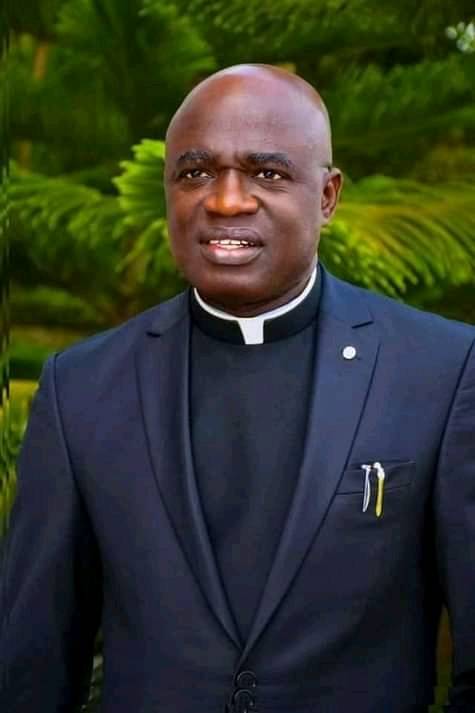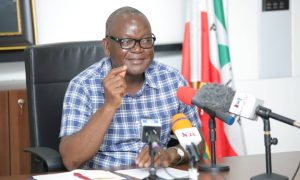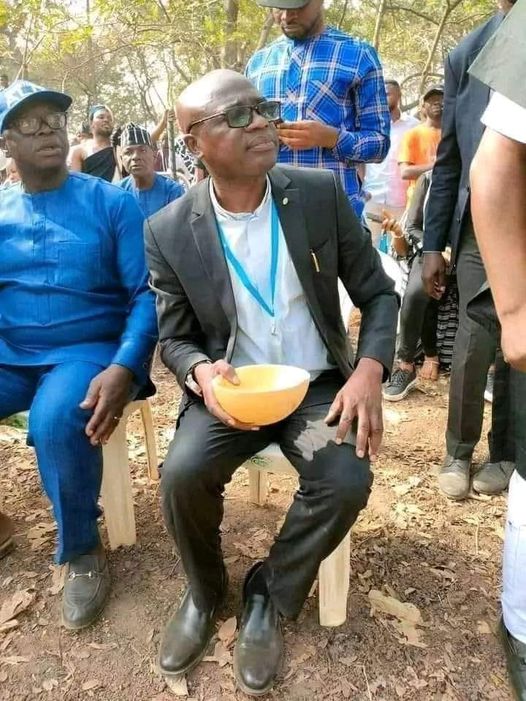Latest News
Father Alia and the burden of a broken vow

By James Uloko
When, sometime in May this year, the news of the suspension of Rev. Father Hyacinth Alia by the Catholic Church broke out, his media aide, Kula Tersoo, issued a statement downplaying its significance and deep import.
He described the suspension of the APC Governorship aspirant (as he then was) “as a normal practice of the Church. He is implicitly officially freed to go on fully with his strides to rescue Benue from total collapse.”
Tersoo was right. Suspension is the normal sanction for a Catholic Priest that decides to join partisan politics full time to the point of contesting election.
It is also true, as Tersoo quoted his principal as saying, that “he is only suspended from celebrating public Eucharistic Masses, but he remains a priest of the Catholic Church forever. After his tenure ends in public civil service he shall resume his public Masses and ministry.” Tersoo did not forget to recall that Rev. Fr. Moses Orshio Adasu of blessed memory who served as the second Executive Governor of Benue state went through the same process.
Since that clarification, the matter has seized to be a serious campaign issue, except occasional tepid reference to it by those who frowned against it. Not even the media has subjected Father Alia’s decision to abandon his priestly vow for partisan politics to serious scrutiny.
The action of Fr. Alia may be normal in the Church but not in morality, to the extent that it violates the oath he swore with God. Although he has not resigned his priesthood, he abandoned the vow he solemnly made before God at his ordination to “receive the priesthood, to magnify (my) callings in it, and to live by every word that proceedeth forth from the mouth of God.”
As a priest, Father Alia set up a Healing ministry that drew large crowds of people seeking divine healing, favour and blessings. As an avowed catholic myself, I once visited one of the healing sessions in Makurdi and confirmed the stories I used to hear about the large crowds of people that normally filled every space inside and outside the hall. Many came with water to be blessed by him and were prepared to wait for as long as it took for him to come. As some testified to receiving miraculous healings, others kept swarming his healing masses to receive theirs.
I learned in course of time that he occasionally had brushes with the ever skeptical authorities of the Catholic Church who queried the spirituality of his healing powers. Obviously he was allowed to carry on based on confirmation of the genuineness of his spiritual powers. If it is true, to me, the use of those powers to save humanity physically and spiritually was Father Alia’s calling in the priesthood which he was magnifying in accordance with the solemn vow he made at his ordination. To abandon the vow and the calling and claiming to have received another calling in politics is, to me, the spiritual equivalent of perjury and moral travesty put together.
It does not matter whether Father Moses Adasu did so before him. It does not matter whether it is normal in the ordinances of the church. It is not everything that is normal in the eyes and laws of man that is correct before God. Many men and women cheat on their spouses. It is normal. But is it right before the spouse and God? Certainly no, because it is a violation of their marriage vows.
There are questions. If Alia took an oath to be a priest and received a calling to heal the sick, did he also receive a calling to join politics and become a Governor? If he did can he, in all honesty, cope with the second calling without compromising the first? To a very large extent, politics, at least, as is practiced is Nigeria, is incompatible with morality or genuine spirituality.
But the more fundamental question is: if Father Alia could blatantly disregard the spiritual oath he swore to, to be a priest of God, what is the guarantee that he will honour the vows he makes with odinary mortals as a politician and Governor? None.
The throngs that have been following Father Alia since the beginning of his governorship aspiration are of the mistaken belief that he would use his priestly and spiritual piety to cleanse our political space of its mess. On his part, the reverend gentleman may have been deluded into believing that the ways of politics are as straight forward as are the ways of the priesthood. If his supporters have not yet discovered how mistaken they are, Father Alia, a well educated priest, must have seen the other side of life as a politician.
He must have realised that those who dragged him into politics did so because of the crowd and the votes he is likely of pulling and polling, and not the positive transformation he may have had in mind. I would be surprised if the Reverend Father was not embarrassed by the ‘election’ that produced him as the APC flagbearer which was turned into a Kangaroo-like affair. Here was an aspirant who had all the people support he needed to win a free and fair primary election, but because such an election no longer exists in Nigerian politics, his sponsors did what he wouldn’t have imagined. Yet, he looked the other way pretending he actually won the primaries.
I can also imagine how the Governorship candidate must have watched helplessly and speechlessly as his political mentors foisted injustice on him and the party as his running mate. By now, the reverend father who is used to baptising Catholic faithful with water, must have realized that political baptism in Nigeria is administered by the most hurtful fire. But this is just the introduction.
There are words all over the place that the plan of those who dragged Father Alia into politics is to convert one of their wives to his wife to serve as the state’s First Lady. Even if the Governor, as he would have become by then, succeeds in resisting the temptation to break another oath – celibacy – by not formalizing the ‘marriage,’ his ‘wife’ would still be as powerful as any powerful First Lady could be.
But he can do nothing about it – just as he was powerless over the circumstances of his nomination and selection of his running mate.
But that would just be the introductory chapter of the Book of Nigerian Politics. The complex and horrific chapters would follow when he settles down to real business of governance. That is when he will realize that the stories he used to hear about politics in Nigeria are not fairy tales. They are stark reality. That is when he will confirm the facts about why his predecessors in Government House fell out with their sponsors or godfathers.
That is when he will realise that making and breaking promises is sugar to those who made him to abandon his priestly vow. And that is when he will realize his mistake and the huge cost of treating a vow with God lightly. The good people of Benue should know better when that moment of decision comes knocking in 2023.
















